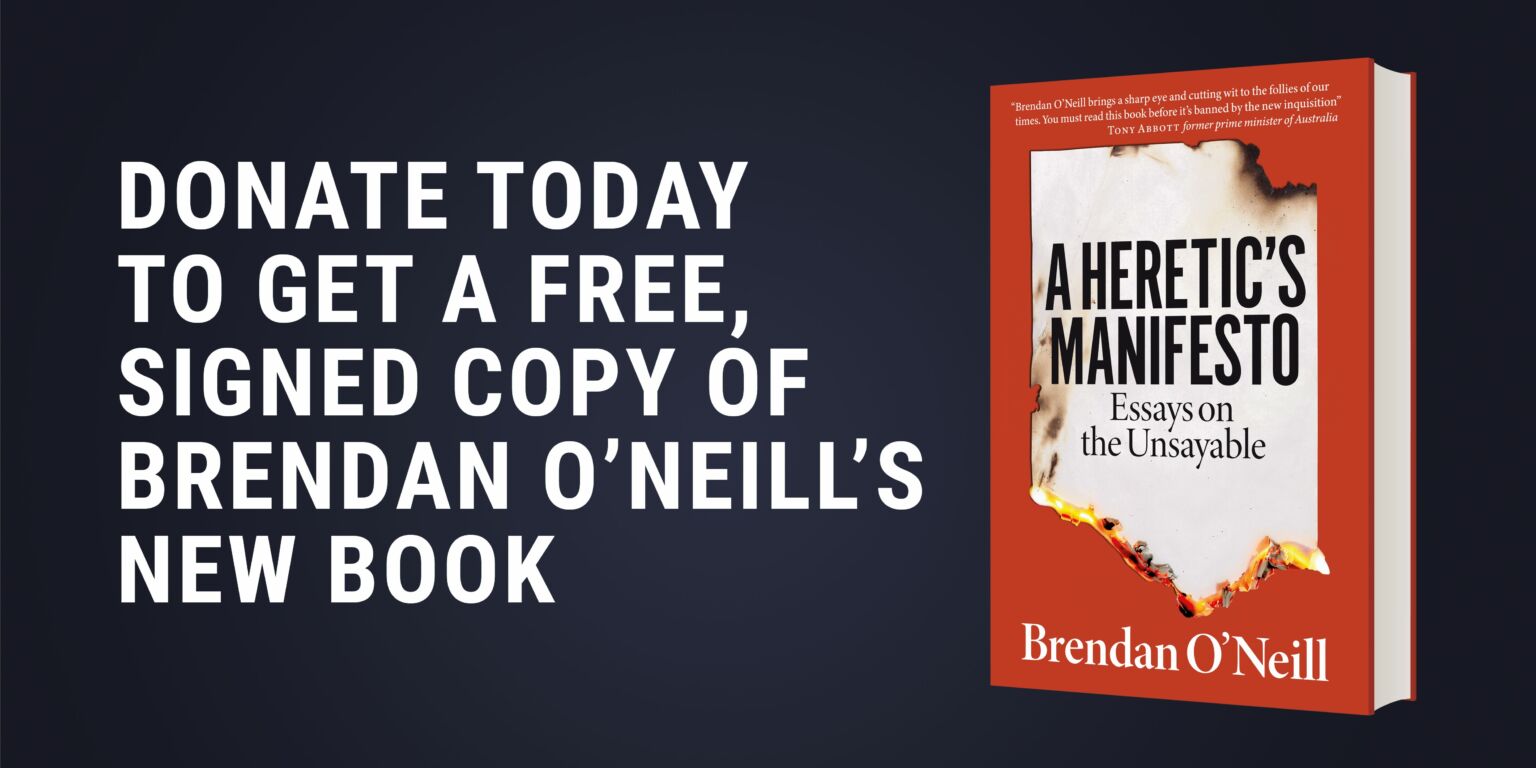Why things can only get worse with Labour
Keir Starmer’s plan to muzzle the press shows he will be even more illiberal than the Tories.

Want to read spiked ad-free? Become a spiked supporter.
Amid the endless Tory crisis, we can still get a glimpse of how, when it comes to our precious liberties, a Labour government would almost certainly be even worse than the Conservatives. One such instance is the latest row over an obscure but important piece of legislation that casts a shadow over UK press freedom: Section 40 of the Crime and Courts Act 2013.
The Tories belatedly want to abolish Section 40, but Labour has vowed to oppose its abolition. This alone should be enough to make anybody who cares about freedom of speech and of the press think twice about voting for Sir Keir Starmer’s party.
Some background. Section 40 was passed in the wake of the 2012 Leveson Inquiry. That was ostensibly an inquiry into the phone-hacking scandal at the closed Sunday tabloid, the News of the World, which became an inquisitorial probe into the entire ‘culture, practices and ethics’ of the British media. It was effectively a show trial in which the tabloid press was found guilty before proceedings began.
Lord Justice Leveson’s final report called for a firm regime of press regulation backed by law – the first such state-backed system since Crown licensing of the printing press was abolished in 1695. An official regulator called Impress was duly established under the aegis of the monarch’s Privy Council. However, understandably, no national news publisher agreed to bend the knee to state-backed supervision. Impress is still boycotted, not only by the likes of the Daily Mail, the Sun, The Times and the Telegraph, but also by the Guardian, the Financial Times and the rest.
Section 40 of the Crime and Courts Act 2013 was intended to force the reluctant news media to submit to state-backed regulation. Its rules mean that if any news publisher not signed up to the official regulator is sued, it will have to pay the substantial court costs of both sides – even if it wins! Dissident news organisations could also be subject to huge fines.
Ludicrously, this form of legal blackmail was presented by the establishment as a ‘carrot’ to induce newspapers to sign up to Impress. As I wrote at the time, if Section 40 was a carrot, it was one shaped like a baseball bat with a nine-inch nail sticking out of the end.
Section 40 was duly passed. But in the face of public pressure (not least a ‘consultation’ exercise that came out overwhelmingly against the new rules), successive Tory governments refused to implement it. The law has instead sat dormant on the statute book, waiting for a Labour government to enforce its repressive regulations, as the party promised to do at the last General Election.
As promised in its own 2019 election manifesto, the Tory government has now reportedly moved finally to abolish Section 40 altogether, as part of its forthcoming Media Bill. In response, the Labour Party has pledged to oppose abolition. Note, Labour has not said that it will oppose the whole Media Bill – only that it will single out Section 40, and make a stand for state-backed regulation of the press.
A Labour Party spokesperson accused the Tories of ‘muddying the waters’ by trying to abolish a dormant law. But, amid waffle about the press playing ‘an important and valued role in our democracy’, this spokesperson also gave the game away. According to this unnamed Labour official, one major threat we face today comes from ‘disinformation and misinformation’. Therefore, ‘It’s right that the press is held to the highest standards and [is] accountable for [its] reporting’.
In other words, a Labour government would want to regulate the press to ensure that it does not spread ‘disinformation and misinformation’ – aka, stories and opinions of which the new establishment disapproves. To that end, the media must be held ‘accountable’. But not, as in a free society, by their many readers, viewers and listeners. No, held accountable by a handful of elite figures on a regulatory committee approved by His Majesty’s Privy Council.
A Labour leadership source added that ‘We know this will trigger a fight with the press, but it has been Labour policy for years to have Section 40. It would look very odd not to stand up for it now the Tories are trying to repeal it.’ Tellingly, Starmer’s party of technocrats honestly believes that it would ‘look very odd’ to stand up for the freedom of the press.
Of course, this issue has been framed as a row between Labour and a few wealthy newspaper proprietors. As the pro-Labour Guardian, which broke the story, reported: ‘Shadow ministers are set to incur the wrath of some of Britain’s most powerful press bosses, including Rupert Murdoch’ by defending Section 40. Hacked Off, the celebrity-fronted lobby for state regulation of the press, even claimed that abolishing Section 40 would mean ‘denying access to justice for the public against multimillionaire national newspapers’.
Two points to remember. First, despite the left’s protestations, its attempts to regulate the news media are never just about taking on ‘powerful press bosses’. These people despise the popular media because they fear and loathe the populace who consume it. Their radical-sounding ire against press barons is effectively a false flag, behind which they wish to police what the allegedly ignorant, gullible masses are permitted to read, hear and think. That’s what it means, for example, when they brand Murdoch a ‘puppet master’ pulling the strings of British public opinion. After all, only wooden-headed puppets could be controlled by such manipulative masters.
Second, if enforced, Section 40 would not only punish ‘multimillionaire national newspapers’. The threat of blackmail would also hang over the heads of any news publication that refused to sign up to state-backed regulation – from the Spectator and Private Eye to spiked. The freedom of press is always an indivisible liberty.
If the Tories do manage to hold their nerve and abolish Section 40, the pressure will be on Labour to keep its word and pledge to re-impose the rules at the next General Election. We all know, of course, that Starmer is now the master of backsliding and broken political promises. But if there is one issue on which Labour seems likely to stick to its guns, it is restricting freedom of speech and of the press.
As reported last week on spiked, senior Labour MP Harriet Harman is already leading a crusade to outlaw ‘sexist’ jokes and opinions in the media, after the independent press regulator, IPSO, caved in and ruled that Jeremy Clarkson’s Sun column about Meghan Markle was too offensive to be allowed. How much more zealous would Labour’s liberty-hating crusaders be with the power of Section 40 and a state-backed regulator behind their sword arm?
Those who think that surely nothing could ever be worse than this Tory shambles – we have been warned.
Mick Hume is a spiked columnist. The concise and abridged edition of his book, Trigger Warning: Is the Fear of Being Offensive Killing Free Speech?, is published by William Collins.
Picture by: Getty.
Celebrate 25 years of spiked!
A media ecosystem dominated by a handful of billionaire owners, bad actors spreading disinformation online and the rich and powerful trying to stop us publishing stories. But we have you on our side. help to fund our journalism and those who choose All-access digital enjoy exclusive extras:
- Unlimited articles in our app and ad-free reading on all devices
- Exclusive newsletter and far fewer asks for support
- Full access to the Guardian Feast app
If you can, please support us on a monthly basis and make a big impact in support of open, independent journalism. Thank you.








Comments
Want to join the conversation?
Only spiked supporters and patrons, who donate regularly to us, can comment on our articles.